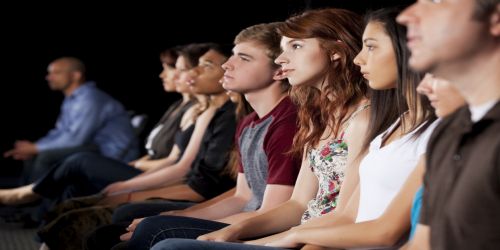Theater etiquette you must not forget

Are you one of those people who have had bottled water or a packet of wafers confiscated when entering the theater and don’t understand why? Is it puzzling when you arrive at the theater half an hour before show time? Well, then this blog is the right place for you. The Theater precedes most other art forms and sports an etiquette developed over generations. Frankly, much of it doesn’t make sense, but there are some key rules which fit the puzzle, when probed deeper. So,what’s so important about theater etiquette? Let’s find out!
When entering the theater, you agree to these things:
-
To be on time

And on time actually means early. Theatrical performances are a co-dependent activity— they rely on mutual respect between the individuals on stage and those that make up the audience. Therefore, the protocol followed by actors and the audience is the same. As one stage manager puts it; “five minutes early is on time. And on time is late. And late is unacceptable”. Therefore, theater-goers are advised to be seated in the hall at least thirty minutes and at most fifteen minutes prior to the performance. If the actors can do it day after day, so can you!
-
In case you’re late
 If, due to some unforeseen reason you cannot be seated prior to the performance, you agree to wait in the lobby until the intermission (when the lights turn on). In some theaters, ushers often direct you to your seats during a scene break or any other breathing space between the action on stage.However, entering the theater while the curtain is raised is absolutely not allowed for many reasons. For one, it is a safety hazard to move around, climb or descend steps in a dark theater. You could trip and fall, or hurt another person. Secondly, the actors on-stage can see you just as you can see them. The noise and movement would be incredibly distractive for an actor trying to stay in character and deliver his or her best. You won’t exactly be a crowd favorite either as people around you would be trying to focus on the play.Furthermore, if your seats are right in front of the stage, it is better to stand at the back of the theater until there is a significant break, where you can move to the front without disruption.
If, due to some unforeseen reason you cannot be seated prior to the performance, you agree to wait in the lobby until the intermission (when the lights turn on). In some theaters, ushers often direct you to your seats during a scene break or any other breathing space between the action on stage.However, entering the theater while the curtain is raised is absolutely not allowed for many reasons. For one, it is a safety hazard to move around, climb or descend steps in a dark theater. You could trip and fall, or hurt another person. Secondly, the actors on-stage can see you just as you can see them. The noise and movement would be incredibly distractive for an actor trying to stay in character and deliver his or her best. You won’t exactly be a crowd favorite either as people around you would be trying to focus on the play.Furthermore, if your seats are right in front of the stage, it is better to stand at the back of the theater until there is a significant break, where you can move to the front without disruption.
-
Make minimal movement and noise after being seated
 Once you are seated and the play has begun/resumed, you agree to not leave the theater unless it is an extreme emergency. The restroom should be used before the performance or during the intermission, for example. You should also avoid talking to people around you while the performance is taking place, because it can be disruptive for the audience as well as the actor, particularly in a quiet scene.
Once you are seated and the play has begun/resumed, you agree to not leave the theater unless it is an extreme emergency. The restroom should be used before the performance or during the intermission, for example. You should also avoid talking to people around you while the performance is taking place, because it can be disruptive for the audience as well as the actor, particularly in a quiet scene.
-
To turn your cell phones off!
 The ringing of a cell phone is one of the commonest pet peeves theater-goers and performers have. Not only does it cause a great deal of disruption, the use of a cell phone also illuminates your face in a dark theater which could distract and annoy an actor. It is particularly annoying when, a character is at their most vulnerable on stage and the room’s emotions are at an all-time high and then a Backstreet Boys’ ringtone starts playing out of nowhere. So please, keep your cell phones on silent or turned off and away from you. Immerse yourself in the world on stage.
The ringing of a cell phone is one of the commonest pet peeves theater-goers and performers have. Not only does it cause a great deal of disruption, the use of a cell phone also illuminates your face in a dark theater which could distract and annoy an actor. It is particularly annoying when, a character is at their most vulnerable on stage and the room’s emotions are at an all-time high and then a Backstreet Boys’ ringtone starts playing out of nowhere. So please, keep your cell phones on silent or turned off and away from you. Immerse yourself in the world on stage.
-
To not communicate with the actors on stage

The theater features some of the most high profile celebrities time and again. While it is understood that you could be overwhelmed with the proximity you have to these stars in the theater, you should not disrupt their performance by communicating with them. There is a difference between a concert and a theatrical performance, after all.Famous stage actors have often complained that their fans often try to talk to them while they are in the midst of their performance. Daniel Radcliffe and Daniel Craig have both mentioned that they have had individuals call out their name and hold conversations with them while they are on stage. This is highly distracting and often takes the actors’ focus away from their character. You are given opportunities to talk to them after the performance, so avail those instead.
-
To participate
 However, you are encouraged to display your emotions during the performance by all means— to laugh, shout out, cheer or sing along (if it is a musical) where appropriate. This boosts the actors’ morale and also creates a shared emotional experience amongst the individuals present in that hall.
However, you are encouraged to display your emotions during the performance by all means— to laugh, shout out, cheer or sing along (if it is a musical) where appropriate. This boosts the actors’ morale and also creates a shared emotional experience amongst the individuals present in that hall.
-
To not take pictures or use recording devices
 The use of cameras is prohibited in theaters during the performance. The performance is exclusively to be witnessed by the audience, unless the company wants to record it officially by themselves. Recording any part of the play and distributing it further is illegal and could result in legal charges.
The use of cameras is prohibited in theaters during the performance. The performance is exclusively to be witnessed by the audience, unless the company wants to record it officially by themselves. Recording any part of the play and distributing it further is illegal and could result in legal charges.
-
To not eat or drink during the performance
 Food and drink are not allowed inside most theaters, although the trend is changing. The reason for this is that the crunching sound of wrappers, or the spilling of drinks often causes a great deal of noise and disruption, something that has no place in the theater. However, some theaters allow “noise-reducing” food from their own cafeterias. Outside food, however, is absolutely prohibited.
Food and drink are not allowed inside most theaters, although the trend is changing. The reason for this is that the crunching sound of wrappers, or the spilling of drinks often causes a great deal of noise and disruption, something that has no place in the theater. However, some theaters allow “noise-reducing” food from their own cafeterias. Outside food, however, is absolutely prohibited.
-
To exercise common sense
 While this list is thorough in itself, there are many other things you can do in the theater. For example, no one will escort you off the premises for taking up the arm-space of someone seated next to you, however it is impolite to do so and you should avoid it. Be respectful, give way to others while entering or leaving the theater and avoid conflict. The energy of a theatrical performance is jointly created and you are contributing to it much like the people on the stage. Make the most of this experience.
While this list is thorough in itself, there are many other things you can do in the theater. For example, no one will escort you off the premises for taking up the arm-space of someone seated next to you, however it is impolite to do so and you should avoid it. Be respectful, give way to others while entering or leaving the theater and avoid conflict. The energy of a theatrical performance is jointly created and you are contributing to it much like the people on the stage. Make the most of this experience.